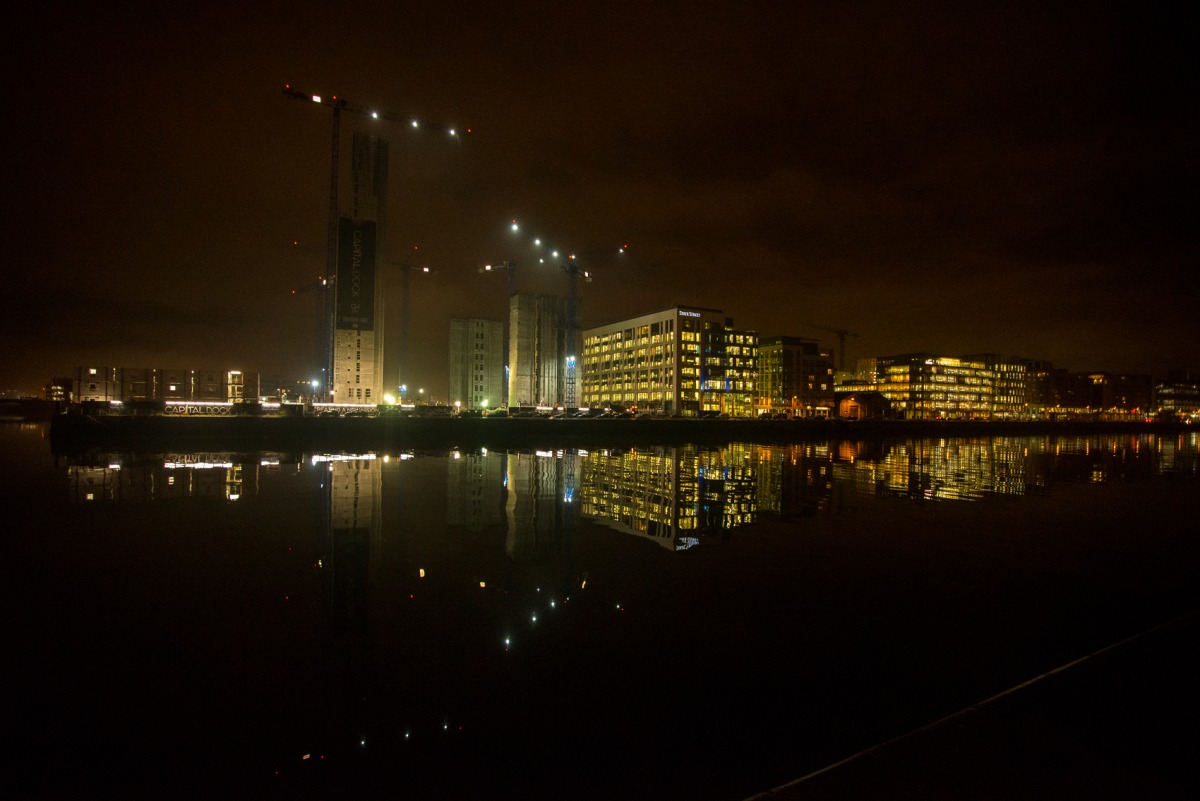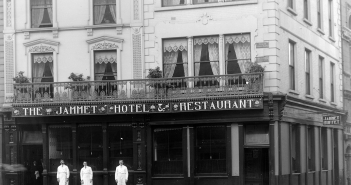It is often said the current Irish housing crisis is mainly the result of a lack of supply of new houses; a supply that slowed down and never really fully recovered following the burst of the property bubble in 2008.
Developers lament a lack of initiative in governments past and present; housing plans replace one another, at least in their facades. The latest example is the Fianna Fail Housing Minister Darragh O’Brien’s Housing for All replacing, or rather refining Rebuilding Ireland introduced under Fine Gael’s Eoghan Murphy – all while multiple cranes never really stopped crowning Dublin’s skyline.
The spin is that this lack of supply, in turn, generates scarcity, which translates into higher prices.
Thus far, the solution we have been served is to create a tax-friendly environment: a de-facto tax haven, to attract reliable (and well-resourced) institutional landlords and investment funds – commonly referred to as Vulture or Cuckoo Funds – to accelerate badly needed developments, besides keeping the Irish banking system afloat.
Apparently, such entities are best placed to pursue ambitious housing schemes, and the management and maintenance of as much of the national housing stock as possible. And supposedly, as in the Housing for All plan, it is the market that is best equipped to understand and deliver the population’s needs, down to every neighbourhood and community.
Frank Armstrong explores the historical origins of capitalism, as the steady financialisation of property threatens the good life we have a right to expect.https://t.co/Lq7z4PeWCP@broadsheet_ie @BowesChay @liamherrick @williamhboney1 @KevinHIpoet1967 @VillageMagIRE @RoryHearne
— CassandraVoices (@VoicesCassandra) September 15, 2021
Unfortunately, however, the nature of this demand, might not be guided by the community’s needs, but the obligation of a certain profit margin for a financial instrument; held in a pension fund – perhaps owned by a kindly grandmother somewhere else in the world – while enriching the asset managers of these private equity juggernauts.
What actually gets built, and at what price, is increasingly under the control of entities that hardly take into account the repercussions for society at large. In some cases they simply up sticks to gnaw on bones elsewhere. The Cuckoos have been here for a long time, locking in the spread between ever increasing rents and the financial costs.
The influence of the banking and financial sector over the delivery of housing has become ever more evident. Thus, the quagmire of basic supply and demand arguments have little or no bearing on how a complex infrastructure such as housing is managed.
It is within the banking sector, and regulations set by the ECB and Irish Central Bank that a substantial proportion of the residential properties of this country are held, packaged and repackaged, and sold in bundles to foreign investment funds in a process called securitization.
For most people, despite the shocking revelations arising out the 2008-09 Crash, the inner workings of those dynamic sytems remain out of reach. We therefore find it necessary to look for guideance from someone who really understands the relationship between the current housing crisis, and the financial markets underpinning this.
Ben Hoey has worked in commercial and investment banking for the past thirty years. After leaving Ireland in the 1980s, he went on to become CFO of Merrill Lynch International:, CFO of Bank of Ireland Capital markets in the wake of the 2008-09 crisis, and managing director of Kennedy Wilson Europe until 2015. Then, as he likes to put it, he failed to retire.
He is now in the process of setting up his own Fintech business, aimed at creating a Rent to Buy structure.
It was while analysing a distressed home loans portfolio on behalf of the Not-for-Profit organisation called Right2Homes, that he awoke to the full scale of banking misconduct, and mis-selling of the mortgages in the first place.
Hoey contends that up to one-hundred-and=fifty-thousand mortgages may have been affected, including some currently in the Courts for repossession hearings, and others that have already been repossessed by banks and Vulture Funds.
He is now taking approximately one hundred test cases of misconduct and mis-selling of mortgages before the Financial Services Ombudsman: and that seems to represent just the tip of the iceberg.
Today, Irish interest rates remain, intentionally, the highest in the EU in order to increase bank profitability. This allows the Vulture Funds to purchase swathes of property and maximise their returns. Nowhere else in Europe offers such attractive rates, and hence Ireland is plagued by the funds, who see us as easy picking. Distressed mortgage holders are simply the low hanging fruit.
How can we explain why an entire generation is paying the highest mortgage rates in the Eurozone, or being forced to rent at at more than double the rate compared to ten years ago? Extreme commodification of residential assets lies at the heart of this.

Image: ©Daniele Idini
Ben Hoey: It’s all about cash flow. Property, as an investment, is valued based on its ability to generate cash. Cash is king, and that’s why these Vultures, even the Cuckoo Funds, can access so much low cost leverage. No one has a hope against them. That’s what’s wrong with the world. Capital markets are so cheap now that they can buy anything. And if you think that the current government policies and Central Bank policies is putting free cash into the system, you need to recognise that free cash doesn’t go to you or I. Free cash flows to the banks to make sure they are solvent and healthy. And it’s the banks that make the fortune out of the free cash from quantitative easing.
Cassandra Voices: What would be the average rate that Vulture Funds will buy loans for? Is there an average or is it dependent on the amount of NPLs versus performing loans if it’s a mixed package, for instance?
Ben Hoey: No, it will never be mixed. Even when Nationwide Building Society was sold off, it was broken into different portfolios of loans depending on the ability of the debtor to pay. For simplicity, there was the complete deadwood, ‘haven’t heard from them in years‘; to the guy struggling; missing every couple of months; to the performing ones [the loans that were regularly being paid off]. So even within the Non Performing world, they split them into different categories and then they’re priced accordingly per portfolio.
In 2018/19, the average pricing for Irish bank’s non-performing residential home loans was circa 65 cents on the dollar. And that’s per portfolio. Nothing is ever priced per loan because it’s all priced on the cashflow of the portfolio. Cash flow primarily generates what price they’re prepared to pay for the portfolio in total. Then, once they work out that, they apportion the price back across the portfolio for tax and regulatory reasons. Other factors such as equity in the home, negative equity, etc. do play a role, but they don’t care much about the price per loan, as each loan position will be managed individually and the portfolio will be managed and funded in its entirety; the objective being to maximise the cash flow on every loan.

Image: ©Daniele Idini
Cassandra Voices: The narrative supporting the presence of Vultures Fund in Ireland is that their investment is a necessary precondition for a stable banking market, and consequently construction industry. Why are we still seeing massive sell-offs of loan portfolios to Vulture Funds? Are the banks still in a sort of intensive care unit and in need of continuous injections of capital, as in the wake of the Crisis?
Ben Hoey: I don’t think so. The banks are generally a cash cow. But what happened in 2009 is that there was a liquidity crisis as international investors and depositors withdrew their cash from the Irish banking system. NAMA was formed to solve that liquidity crisis in the banks. Most of the developer loans, which were completely dead in the water (with no cash flow), which were extensive relative to the rest of the banking market, were transferred to NAMA and again cheap, very cheap bonds were issued to support the purchase. All of those bonds were issued to the banks that transferred their loans. They effectively swapped their bad developer loans for low cost NAMA bonds which greatly improved their liquidity and capital position, as they could use those bonds to generate cash or liquidity in the market. NAMA was vital to addressing the liquidity issue in Irish Banking at the time.
The interesting thing is that actually they didn’t start getting the residential loans off their books until about 2016, 2017 and 2018. So, there was clearly no rush as the liquidity crisis passed. The main reason that the banks in Ireland started to sell the residential loans was that the European Central Bank said: “guys, we are worried about the next crisis and you’re still living in the current crisis. So get your residential non-performing loans down below a certain percentage of your balance sheet.”
It was typically seven percent on residential NPLs dropping to around five percent. So the Irish banks, faced with severe imposed capital costs, were strongly encouraged to sell their portfolios to hit these ratios. The European Central Bank brought in horrendous capital hits like a 100% reduction of your capital if you didn’t get below that level. So, for example, if you had a €100 million loan portfolio and you had provided say €60 million against it, your exposure to future losses was only 40, the ECB was saying: “if you don’t get below that ratio, then an ever increasing amount will be deducted from your capital, greatly limiting your ability to undertake new business.”
We need a strong banking system which is ready for the next crisis. So after NAMA, there does not appear to have been a liquidity crisis for the Irish banks and, by their very nature, liquidity crises need to be solved immediately, as they are not like property and health service crises, which seemingly can go on for decades.
In 2008-2009 the Irish government stepped in and did the craziest thing ever, which was to guarantee €400 billion of customer deposits, because all the international deposits were leaving the Irish banking system literally by the second. And they actually started to realize that, oh, my God, we have a bank account too that needs to be funded – and, they know, it’s going to run out of cash soon. And that was the problem. Nothing to do with lack of profitability. It was lack of cash or liquidity as it is better known in the industry.
The land question has haunted Irish politics since time immemorial. Frank Armstrong attributes the current acute housing crisis to the colonial settlement.https://t.co/7Qp4K5wQrr@broadsheet_ie @BowesChay @vincentbrowne @connolly16frank @caulmick @RoryHearne @fallon_donal
— CassandraVoices (@VoicesCassandra) August 17, 2021
Cassandra Voices: So it was the withdrawal by investors, essentially a withdrawal of money by other banks or investors?
Ben Hoey: By all the deposit base. Ok, not so much the Irish people, because they had access to the deposit guarantee scheme already. There was some stories of customers moving their cash to Switzerland and they all lost their shirts on the exchange rate. But no, in the main, it was the big institutional money that would have always chased the higher yielding banks. So, the Irish banks would have been paying a greater rate because they were less safe, because of country risk, etc. So as soon as those institutions got scared, they just pulled the cash out and the short term money markets closed to the banks. All right. And then that’s when the ECB had to allow Irish banks to start printing bonds. So they printed money. They issued bonds. But it was to save the banking system. Yeah, I think that was the bottom. Remember, you can only have a liquidity crisis over a short, very short, period. The liquidity crisis is a week or two weeks where – I always have to remind people – the truth is hard to establish, as each bank fights for survival and many assumptions have to be made by chief executives. It’s a very, very awkward position to be in.
Cassandra Voices: Isn’t it the job of bankers to project a level of confidence that might exceed the reality of the picture?
Ben Hoey: The chief executive always has to take the optimistic view. Then, you know, you look at the Irish regulator at the time. He looked at that crisis. I don’t know where he got his information from. He came out and said that the Irish banks are well capitalised to weather the storm. So there was a man who wasn’t even a chief executive talking up the banking system in order to give it a chance of survival. I think a month later it was all over. But to have no liquidity is what kills a bank, not lack of profit, as the accounting rules are focused on the long-term profitability of the banking system.

Image: ©Daniele Idini
Cassandra Voices: But what happened to Iceland in your view? Did they do the right thing when they more or less let their banks fail.
Ben Hoey: They had no choice. There was no EU there to support them. You know what partially got us into the problem was joining the EU: the euro and cheap money coming into an economy that was used to expensive money. People thought, “I can service a million euros worth of tracker mortgage for six bob a week.” And so when we went into the crisis, the ECB helped us out. We are part of the euro. We couldn’t be brought down. But Iceland had no backstop. They were on their own. It was a common belief that the guarantee by the Irish Government of €400 billion of bank liabilities was stupid, but the markets ignored it. Do I think NAMA was a good thing. Yes, I think it saved the liquidity of the Irish banks.
It’s after that period, after 2010, there was a tremendous opportunity for Irish banks to rebuild and innovate. And they didn’t. They just sank back in and took the cheap money and did the same thing day in and day out. And then they screwed their own customers, beat the shit out of them, treated everyone the same. Talked about moral hazard and how certain members of our community overborrowed and made a mess of it. I hope society never forgives them, but some people move on. So in answer to your previous question, after the liquidity crisis was solved they didn’t need to sell their NPLs, they wanted to sell them. They didn’t need the cash. In fact, the banks were overcapitalised in my view and wanted to repay capital.
Cassandra Voices: So if the banks, after 2010, were not in need of cash, but they were forced by the ECB to sell most of their distressed loans nonetheless, why didn’t they consider more ethical solutions that would have protected family homes for example? Instead of selling to the American, Canadian or other international funds?
Ben Hoey: Two reasons. Execution risk and moral hazard. The moral hazard in this case is: banks say we can’t give a discount to someone even though they might deserve it, or we may have lent them too much cash. We can’t restructure the loan fairly and write off some debt as their neighbours will want a debt write off too. You can argue all day as to whether that’s right or wrong, but that’s the moral hazard argument. So they have to sell to someone who would be seen to be not so fair. And there’s a lot of hassle and maybe a bit of shame. Moral hazard helps to embed that shame in people. So that’s the moral hazard,.
Then there’s execution risk. If you consider, at the end of the day, you have a bank official charged with selling several billion euros worth of loans. So you have a small number of ambitious well paid people who want to continue to be successful. So do they sell to Brian Reilly and his not-for-profit initiative, who’s never done anything like this before, who appears to have the funding, but it’s never been executed? Or do I just give it to Cerberus, who will walk in the door with the cheque immediately?
You know, the head of Lone Star, the richest Irishman in the world, John Grayken, visited some of the Irish banks selling assets, which is akin to Warren Buffett popping in for a chat; that’s powerful messaging to Irish bank officials who need a guaranteed sale. They are big talkers; you tell me the cheque you want and I’ll write it now. That’s execution risk. There’s no executive risks with the likes of Lone Star or Cerberus.
Cassandra Voices: What do they ultimately want out of all of this if, at the end of the day, they’re buying something that’s not performing? The cash flow really isn’t there. Do they want the properties? What do they want out of this?
Ben Hoey: The normal model was they would price the portfolio on the current cash flows and then, after the purchase, they would improve those cashflows or liquidate some loans, i.e. repossess. And, in certain cases, they do deals for guys to walk away. So, say the property was worth €100,000 for simplicity sake, and they gave the guy twenty grand to walk away. God knows what they bought the loan for, but they ask themselves: “is this the maximum cash we can get here?” So €100,000 sale price, minus the 20k that they gave them to walk away. That’s generated €80k today, and the today is very important. That would have fed into the model. So it’s all about maximizing the cash flow.
When they couldn’t maximize the cash flow because the Irish courts didn’t cooperate, they minimized the cash outgoing. So, originally when you buy a non-performing loan book that actually has a bit of cash flow, you don’t use all your own money to buy it. You go to a London bank and they give you what’s called a loan on loan. So they lend you money, and probably at one and a half percent, up to 60 percent loan to value, secured on the loans you bought. So that’s really cheap. But your own equity needs are say, nine percent unlevered.
After a while you think this is not going anywhere. I’ll just put the whole lot into securitization vehicle and then issue triple-A notes up to a high percentage, paying out 80 basis points. So, they drive down their funding costs, which again enhances the cash flow. Net cash flow.
Yeah. It’s all about cash. Show me the cash. The trouble is that they couldn’t do deals with Irish people because there was so few who had any cash and had no access to cash. And the Courts wouldn’t allow them to repossess.
Cassandra Voices: And what has all of this to do with the Housing Crisis? How does this affect supply and demand on the Irish housing market?
Ben Hoey: You said “there’s no supply.” So how do you know that? Supply of what to who? No one has defined how many affordable and social houses our society can afford. We don’t actually know what supply we’re trying to meet. And, you know, like all journeys, if you start in the wrong place, you have no hope of getting to where you want.
The pension fund, the Vultures, are just one mechanism of delivery. But who are we trying to supply to? The family paying a bit of tax, probably earning up to €80,000? They should be able to buy a home or rent it affordably. We’re not trying to supply housing to a German pension fund. They don’t need housing. They need profit.
Cassandra Voices: But a larger section of society in Ireland actually needs housing. And instead, what you are saying is that we are supplying Vulture and Cuckoo Fund profits, through the delivery of housing for their needs, and not the Irish people?
Ben Hoey: Can you imagine if Apple said they were going to build a new phone with special features and they were going to sell it to a German pension fund so they could sell it on to our citizens? That’s exactly what we’re doing here. We’re saying we’re building these houses for German and U.S. pension funds because they’re the only ones that can afford them. We put a profiteer in the middle – a middle man. And that’s what happens when you commodify an infrastructure, a key infrastructure like housing.

Image: ©Daniele Idini
Cassandra Voices: Is this by design where we are now in terms of housing?
Ben Hoey: This is inevitable when you make something a tradable commodity. You’ve turned homes into an investment class. There’s no rules anymore. The cheapest money will get the deal. And that’s the fundamental issue.
What would happen if the Vultures took the airport over and were charging everyone €300 a head to get through? It wouldn’t happen because it’s so obviously wrong. But so is just about everything obviously wrong with the family home market. And you can see the effects. You go to Dublin, North Docks and South Docks; There are thousands of beautiful apartments, worth €600,000 to a million sitting empty because the German and U.S. pension funds want that type of housing, as they were told there’s loads of wealthy young people living in the city. How’s that worked out? Again, their money is so cheap that they can leave those apartments empty, and wait for rents to recover.
There’s no crisis for them, even though their flats are empty. We’ve actually allowed a particular type of Vulture investor to dictate the supply of family homes to the Irish market.
Back in the 1990s and early 2000s, we started building stuff all over the country where it wasn’t needed. We’ve learned from our mistakes, but we’re building the wrong sort of property in the right place: and this kills me as a capitalist to say it but… stop treating family homes as a commodity that can be traded. It will make the cost of labour very expensive and the country very unproductive.

Image: ©Daniele Idini
Cassandra Voices: Would it be possible to gradually stop treating the residential property market as a tradable commodity?
Ben Hoey: No, I think you have to go back to basics and look at the complete supply chain: who ultimately is the rightful owner? Is it the individual, the government, or is it a commercial operation? And then you’ve got to put the right structure in place. And the funding naturally comes. Everyone looks out to different models such as the Austrian model etc. And they do work, but you can’t just pick and choose bits of them. You’ve got to look at the whole structure, holistically.
Cassandra Voices: Ultimately it comes down to a vision of the society that we want to live in. And in order to define this we need a political environment that is willing to build an economic system that takes into account the needs of the population at large, and as you said is willing to define, in the first place, what those needs actually are. In the case of the Irish housing markets, the problem doesn’t seem to to be about access to financial resources, but again, who has access to it.
Ben Hoey: When I was listening to you there, I was thinking about how we got rid of the British landlords in the past, who took the land with the backing of military power. And we’ve replaced them with, private equity, the Vultures who have employed not military power, but their cheap money. If only you knew the pain they go through before they decide to buy or to build. If you watch that pain, that risk mitigation, you realize how naive we are. The governments says build, build, build. But the clever money agonizes before it decides what to do. The Vultures know exactly what they want. But we don’t. So we end up being picked off.




